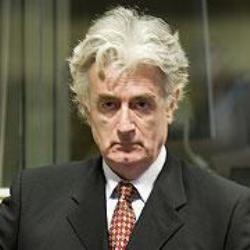Karadzic wrote to the tribunal in October last year requesting permission to give a face-to-face interview to the press inside the United Nations Detention Unit, UNDU.
“For many years, the prosecutor and others have demonised me in the media without any opportunity for me to present my side of the story,” he argued, in an apparent reference to former chief prosecutor, Carla Del Ponte.
The court’s registry initially rejected his request, saying that allowing a journalist into the UNDU constituted “a real threat to the safety and security” of the prison, while “the possibility of sensational reporting” could interfere with the administration of justice.
On appeal, however, tribunal vice-president Judge O-Gon Kwon overruled the registry, saying that although the journalist could not enter the prison, Karadzic could contact her by letter or telephone.
The judge ruled on February 12 that in failing to consider other means by which Karadzic could communicate with the journalist, the registry had placed “an unreasonable and disproportionate restriction on [his] freedom of expression”.
“It seems quite apparent to me that it is possible for [Karadzic] to contact the media in such a way that does not compromise the security and safety of UNDU,” ruled Judge Kwon.
Karadzic is on trial at the Hague tribunal charged with 11 counts of war crimes and crimes against humanity carried out in Bosnia between 1992 and 1995.
The charges against him include responsibility for the 1995 Srebrenica genocide when nearly 8,000 Bosniak men and boys were massacred, as well as the 44-month siege of Sarajevo, which resulted in approximately 12,000 civilian deaths.
In his appeal of the initial decision, Karadzic argued that after his arrest in July 2008, the prosecution had issued statements and that it was “only fair” that he be allowed to express his views as well.
Karadzic will now be allowed to communicate directly with Zvezdana Vukojevic, a journalist from Dutch magazine Revu, under the supervision of the court.
He said in his application to give the interview that he wishes to tell her about an agreement that he claims he made with former United States envoy Richard Holbrooke, who allegedly promised him immunity from prosecution in return for quitting politics.
Although the registry had argued that Karadzic may try to use the interview to make political statements, Judge Kwon ruled that a discussion of the alleged immunity agreement would not compromise the tribunal in any way.
“I therefore do not consider it reasonable for the registrar to conclude that the topic for discussion alone is reason to prohibit communication with Ms Vukojevic,” said the judge.
It is common practice for lawyers representing defendants at the tribunal to speak with the press. However, since Karadzic is representing himself during his trial, he does not have someone to present his case in either the courtroom or in the media.
Self-representing defendants have previously caused controversy by courting publicity.
Ultra-nationalist Serb politician Vojislav Seselj, who is also serving as his own counsel, had his trial adjourned indefinitely this week due to fears he has intimidated prosecution witnesses. Prosecutors asked for the adjournment on the grounds that witnesses were being intimidated and judges granted the request.
That followed a ruling in December 2003, when the court limited Seselj’s communication to just his family and legal counsel after he spoke directly to the Serbian media from a telephone in the prison.
Seselj’s legal representatives have denied that he is involved in intimidating witnesses.
Former Serb president Slobodan Milosevic, who died in the UNDU in 2006 before his trial concluded, also sought to run his own defence in a way that was seen as politicising the proceedings and gaining himself maximum publicity.
However, Judge Kwon noted that the registry had not mentioned any signs of Karadzic wanting to undermine the tribunal.
“[Karadzic] has not made an excessive or unreasonable number of requests of this nature and the topic for discussion is limited and has been disclosed to the registrar,” wrote the judge.
Karadzic’s legal adviser, Peter Robinson, welcomed Judge Kwon’s decision.
“We are pleased with the decision of the vice-president that allows Dr Karadzic to have contact with journalists. Dr Karadzic looks forward to telling his side of the story,” he told IWPR.
Observers of international justice also saw the ruling as a step forward.
“I think it’s probably a good decision because it shows that restrictions should only be imposed when there are specific circumstances that justify those restrictions,” Alex Whiting, a former prosecutor at the tribunal, told IWPR.
“If it turns out that in making these exceptions it becomes a problem, it becomes disruptive, then perhaps a general ban will be justified, but at this stage I think it’s good to approach it on a case-by-case basis.”





